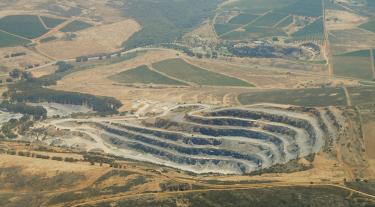Avoiding the worst impacts of climate change requires the global economy to prevent average global temperatures from increasing by more than 1.5°C. To do this, we must reach Net Zero emissions by 2050. Simply put, this means reducing greenhouse gas (GHG) emissions as much as possible before using credible carbon removal offsets to “neutralize” any remaining hard-to-abate emissions.
A big part of this global transition must occur in the energy sector, what has been termed the global energy transition – moving away from fossil fuel-based energy technologies to renewable energy and low-carbon technologies, like solar, wind, batteries, electric vehicles, and green hydrogen. The problem with all of these low-carbon technologies, which are needed by almost all sectors to decarbonise, is that they are metals-intensive and cannot be recycled (yet). Producing enough solar panels and wind turbines to meet global energy demand is going to cause demand for “energy transition metals” (ETMs), such as copper, nickel, and steel, to sky-rocket. And that means more mining!
On the one hand, this is a good thing, particularly for Africa, given its abundant reserves of ETMs and the opportunity they present for supporting economic development. On the other hand, unsustainable and irresponsible mining practices threaten to perpetuate environmental degradation and social inequalities that continue to plague the African continent. It is, therefore, imperative that the increased mining and production of ETMs decouples itself from GHG emissions and other environmental and social risks that mining presents.
To this end, it was fantastic to see sustainability topics becoming mainstream at this year’s African Mining Indaba. While conversations continue to focus on the economic opportunities for mining in Africa, it’s encouraging the see a shift that incorporates environmental and social issues in a proactive, definable manner, together with economic discussions. For example, the International Council on Mining and Metals unveiled their new Social and Economic Reporting Framework. The framework aspires to create uniform and transparent reporting indicators to empower communities, governments, and investors to assess the contribution of the mining companies to social and economic development. The importance of good environmental, social and governance (ESG) performance was emphasised by financial institutions for miners wanting to access sustainable finance. Financial actors were also increasingly wanting to understand how positive social impacts from mining can be measured to better inform their financial decision-making. One of the more interesting takeaways from Indaba included learning about leapfrogging of fossil fuel-based energy that’s occurring in Guinea, where mining communities are surpassing fossil fuels in their transition and increasingly implementing renewable energy. The primary driver behind the use of solar-based energy was not so much for climate mitigation (Guinea contributes less emissions than some states in USA), but rather for securing affordable energy access, allowing communities to leapfrog fossil fuels (and enjoy associated environmental and social co-benefits).
After perhaps losing ourselves in the aura of miners seemingly becoming sustainability experts, we were quickly brought back down to Earth when someone asked us if “the strong focus on climate mitigation was really relevant for Africa?”. Given the continent’s limited contribution to the climate crisis, whilst simultaneously being the most vulnerable to its impacts, suggests that answer to the question is, in fact, no. While climate change mitigation is, of course, necessary, what is equally important, if not more so for Africa, is climate change adaptation – building resilience to climate change and ensuring a just transition.
For us, this means ensuring a just transition to a sustainable and inclusive African economy, one that is underpinned by the sustainable production of critical ETMs. You’re probably thinking that a just transition is only necessary for the coal sector and making sure that “no one is left behind” in the transition away from coal-based to renewable-based electricity systems. I’m glad to say that you’re not wrong. But just as sustainability is more than climate change, a just transition is more than just about coal. We need to ensure that the expansion of mining in Africa to provide the world with ETMs results in shared value for all. At the same time, we need to make sure that decarbonising the production of these ETMs also generates net-positive environmental and social outcomes for all mining stakeholders. That means, for example, protecting existing jobs and livelihoods, whilst creating new opportunities. Simply avoiding ESG risks is quickly becoming obsolete and the expectation that mining positively contributes to Africa’s sustainable and inclusive development is growing.
The low-carbon transition comes with various challenges and opportunities, not only from an environmental perspective, but also in the consideration of the social dimension in the global transition. Companies are continuously stepping up to find solutions to climate change, however, the balance between sustainability efforts and company growth continues to be a challenge. While there is an increase in the number of companies committing to achieve Net Zero by 2050, recent analysis by Climate Action 100+ indicates that many of these targets are not underpinned by robust strategies, and global emissions are at an all-time high. The United Nations has also recently announced the formation of an expert group that will scrutinise company Net Zero pledges in an effort to prevent greenwashing. While companies are eager to be part of climate solutions, for many, the pathway for doing so and translating this into business action remains unclear.
Company decarbonisation strategies are unique and fit for purpose, however there are basic elements that need to apply in their development. As a starting point, companies need to assess their carbon footprint to understand the drivers of emissions and identify opportunities for carbon reduction. With this initial insight into baseline emissions, companies can set ambitious, yet feasible short- and long-term Net Zero targets to address Scope 1, 2 and 3 emissions. Developing a decarbonisation strategy and credible action plans will be key for decision-making, including efforts to drive deep decarbonisation and the role of carbon offsets in achieving targets. Companies will need to continuously identify, invest in, and implement emerging and innovative low-carbon technologies to reduce emissions, while also trying to maximize broader environmental and social co-benefits for a just transition.
The enormity of ensuring a just transition to Net Zero mining in Africa is beyond the capability and resources of an individual company. Trusted partnerships and collaboration with governments, policymakers, local communities, labour, civil society, technology developers, industry associations and financial institutions can create an ecosystem for change. Executives and decision influencers need to consider value chain and cross-sector integration in their decarbonisation strategies.
Decarbonisation for the industry will not be easy, however we cannot afford to delay action any longer. While it’s encouraging to see the strong focus on sustainability in mining, the key will be advancing strategies and action plans coupled with timely action. Mining companies must engage with stakeholders in a participatory and inclusive manner to better understand stakeholder needs and help inform decision-making, minimising business and broader ESG risks and challenges, and accelerating decarbonisation efforts in Africa.
References
- Climate Action 100+. 2022. Climate Action 100+ Net Zero Company Benchmark Summary of company assessments, March 2022. https://www.climateaction100.org/net-zero-company-benchmark/findings/
- International Council on Mining and Metals. 2022. Social and Economic Reporting: Framework and guidance. https://www.icmm.com/en-gb/guidance/social-performance/social-and-economic-reporting
- Plan A. 2021. What does decarbonisation mean for companies? https://plana.earth/academy/what-does-decarbonisation-mean-companies/
- Volcovici, V. 2022. U.N. launches group to hold companies to account for net-zero pledges. https://www.reuters.com/business/sustainable-business/un-launches-group-hold-companies-account-net-zero-pledges-2022-03-31/
- World Climate Foundation. 2021. Holistic approach to the energy transition. https://www.worldclimatefoundation.org/post/holistic-approach-to-the-energy-transition



